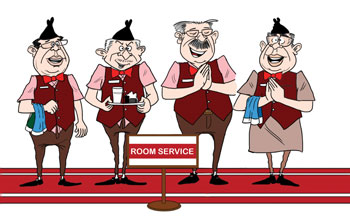
DIWAKAR CHETTRI
Protocol violations by former prime ministers, ministers, and leaders as they queued up outside Dwarika’s Hotel last week to meet Indian Minister of External Affairs Salman Khurshid set off a self-righteous nationalistic uproar in Nepal.
Not a single newspaper could resist dashing off an outraged editorial. Many saw it as an affront to Nepal’s sovereignty and national pride. Though such criticism was not unwarranted, this is not the first time our leaders have chosen to ignore protocol. From Baburam Bhattarai to Pushpa Kamal Dahal, from Madhav Kumar Nepal to GP Koirala, they have all been guilty of hosting or visiting ambassadors and dignitaries without the knowledge of the Ministry of Foreign Affairs.
While a particularly egregious example of our leadership’s lack of political acumen and tact, the queue at Dwarika’s was only the latest proof of Nepal’s sinking image in regional and global politics. What does it say about a country when ex-prime ministers line up to kowtow before a foreign minister and use the occasion to bad mouth fellow Nepalis, weave excuses, grovel and beg, and come up with no coordinated national response to resolve our national crisis? Never in our history, not even when our neighbour to the south was British India, have we stooped so low.
One might argue that Nepal is an important trading and investment partner for its northern and southern neighbours and this may give us an inflated opinion about our own geo-strategic importance. Given our economic crisis and political mismanagement, the only reason our neighbours are interested in us is because Nepal might just blow up.
Our trade deficit with India of Rs 290 billion a year is so heavily lopsided that India doesn’t even see it in its own national interest anymore. Petroleum imports have doubled in three years and because of our lack of foresight in switching to renewable energy, it will continue to grow.
And even as we try to extricate ourselves from the
FAFT’s (Financial Action Task Force)
‘grey’ list and create a more conducive environment for foreign direct investment, unless there is long-term political stability and continuity in economic policy, we will carry on being regarded as the poorest and sickest country in the region.
Trips to China and India have long been a rite of passage for our prime ministers, but it took more than a decade after Chinese Prime Minister Zhu Rongji’s tour in May 2001 for the next premier to step on Nepali soil. Cancelled at the last minute and rescheduled, when Wen Jiabao finally made it to Kathmandu in January 2012, the visit lasted for just five hours. Nepal was just on the way from somewhere to somewhere.
India’s record is even more abysmal, with the last prime ministerial visit taking place 16 years ago. Compare this to Bangladesh, Bhutan, and Afghanistan which have been hosting successive Indian and Chinese prime ministers and presidents – almost one major visit a year. For three years now, Nepal has also had no ambassador in the country that is politically and economically the most important to us.
Outside of South Asia, too, Nepal seems to have lost what little clout it had. Barring the occasional trips by heads of aid agencies and experts, high profile visitors just don’t bother anymore. It is as though Europe and the United States have outsourced their Nepal policy to New Delhi and so a Kathmandu pit-stop is no longer deemed necessary.
Although bilateral relationships hinge on more than glossy photo-ops, these visits have symbolic value. Former Secretary of State Hillary Clinton made a two-day pit visit to Dhaka during her Asia trip last year before heading to India. While confirming the value the Obama administration placed on economic ties with Bangladesh, the trip also marked the US’s endorsement of Bangladesh as a role model for other developing countries where trade now supersedes aid.
It’s not surprising, then, that except for major events like Everest anniversaries and plane crashes, Nepal falls in the international media’s blind spot. The scant coverage it gets is usually heavily influenced by Indian views, with the nation pegged somewhere between a failing and a failed state.
Nepal is in serious need of rebranding and restoring its self-esteem. The place to start is to stop blaming others and each other. Nepali leaders need to first deliver on promises to their own people and get our politics right.